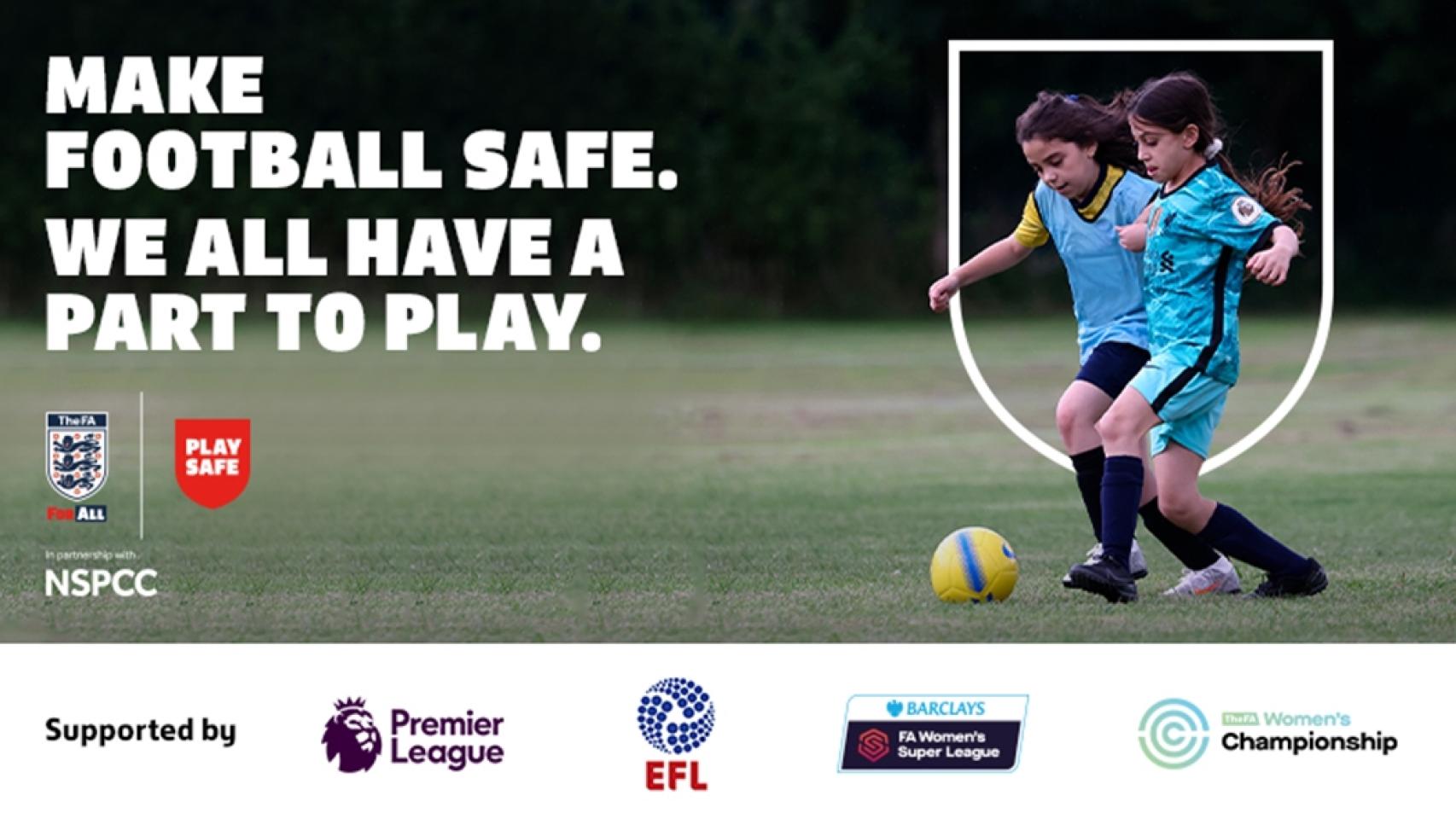The whole of football in England – at every level – joined forces to promote ‘Play Safe’, a national campaign to focus attention on the vital importance of safeguarding in football.
Play Safe is officially supported by the NSPCC and will run on a designated weekend every season from now on.
At the heart of the campaign are three short films to emphasise the importance of safeguarding for key groups of people, crucially children themselves. As you’ll see, England men’s and women’s players are right behind Play Safe too.
“As a youth team coach, I will be working with my club to ensure we support the Play Safe messaging,” says FA Chief Executive Mark Bullingham. “I am also pleased that the campaign has the support of the former footballers with lived experience of abuse in football, who are on our Survivor Support and Safeguarding Advisory Group. The Group has collectively said:
“Learning from the past is crucial, so that we can prevent the horrific experiences that happened to us and so many others in football, from happening again.
“As a group of survivors, we fully support the ethos and important messages that Play Safe conveys – whether to club officials, parents/carers and or vitally, children and young people themselves. Equally important is that Play Safe is not a one-off campaign – it will be used at key points in the football calendar to remind everyone in football, that children’s welfare and keeping them safe, should be at the heart of all that we do.”
As the Survivor Group points out, you’ll see Play Safe appearing at various points throughout the season to keep safeguarding front of mind in football. Together, we want to do everything we can so everyone – particularly children and young people – has a consistently positive experience of our great game.
“Play Safe demonstrates that the game is united in the shared goal to ensure safeguarding is embedded in everything we do, particularly when working with children and young people,” emphasises Sue Ravenlaw, The FA’s Head of Safeguarding.
“There are robust reporting systems in place across the game and The FA has a professional Safeguarding Case Management team. We continue to drive continuous improvements across the game through the Premier League and EFL Safeguarding Standards and the Safeguarding 365 Standard for County FAs, which emphasises the everyday place safeguarding has in football. Premier League and EFL clubs, as well as County FAs, are independently assessed to ensure safer working practice is evident across the country.”
“Behind everything we have in place is one simple objective: to create fun, positive football settings where children and young people can enjoy the great game we all love.”
So whatever your role in football – whether an active participant or an administrator, please remember safeguarding is everyone’s responsibility.
For example:
If you’re a coach working with children:
- Is your DBS Check up to date?
- Are you up to date with The FA’s ‘Safeguarding Children’ course?
- Do you regularly check-in with your players and help them to feel safe to share their thoughts and speak up about any concerns?
- Are you following safe practice when communicating with under-18s for example via social media?
If you’re a Board or Committee member at a club or league:
- Have you taken The FA’s ‘Safeguarding for Committee’ members’ course?
- Does your club have a formal welcome process for new players and their parents/carers?
- Are all your club’s safeguarding policies and procedures up to date?
- Are your Club Welfare Officers contact details widely available?
- Is safeguarding a constant item on your main meeting agendas and in your club’s day to day practices?
If you’re a parent/carer:
- Do you know your child’s club Welfare Officer?
- If so, do you have their tel no. in your ‘phone, as well as that of the NSPCC?
- Are you up to speed with your child’s club’s safeguarding policies and procedures?
- Have you taken The FA’s free online ‘Safeguarding For All’ course?
- Do you regularly check-in with your child to see what they are enjoying/not enjoying and why?
If you’re a Club or League Welfare Officer:
- Do you know who your County FA Designated Safeguarding Officer is?
- If so, do you have their tel. no in your phone?
- Have you reviewed your club’s or league’s safeguarding policies and procedures recently?
For more information on the safeguarding framework The FA has in place, together with numerous helpful guidance notes, please click here.
Play Safe is not a one-off campaign – there will be a designated Play Safe weekend every season. It will also be used to support other safeguarding-related events during the year, e.g. Anti-Bullying Week, Safer Internet Day and NSPCC Parents in Sport Week.
If you are worried about a child, it’s vital you report your concerns. Doing nothing is not an option. It’s also important you stay calm, and if any child is present, reassure them they are not to blame. But don’t make promises of confidentiality or outcome.
There are five ways to report a concern:
- To your club or league Designated Safeguarding Officer – please find out from your club who these people are;
- To your County FA Designated Safeguarding Officer. Click here for a list of County FA contacts;
- By emailing The FA Safeguarding Team at safeguarding@TheFA.com;
- If urgent and you cannot contact your club, league or County FA Designated Safeguarding Officer, you can contact the NSPCC Helpline for expert advice and support on 0808 800 5000 or help@nspcc.org.uk;
- If it is an emergency because a child or children are at immediate risk, then call the Police or Children’s Social Care in your area.
For additional resources and to view the videos in sign language or audio-descriptive versions, please visit: www.thefa.com/PlaySafe.

